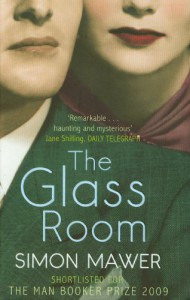The Glass Room

Reader! Do you want a badly written romance novel with GCSE level attempts at symbolism and ‘depth’? Look no further. Not that this is how The Glass Room is described. If it was I wouldn’t have gone near it. This, after all, is a book shortlisted for The Booker Prize.
“Life is like that”, he said, his gaze caught by the glow of the light reflecting against the Onyx wall as evening fell. “Modern is the future”. And then they had sex on the linoleum.
Or something like that.
What we have is a book which focuses on a fictional version of Villa Turgendhat and mentions over and over that it has a glass room with an Onyx wall. Apparently the light and space can be used to symbolise anything you want and loads of people have sex in it. With the subtlety of a brick, this symbolism or reference to the title of the novel is hammered into your brain time and time again.
Seemingly all Mawer has done is lifted the history of the building and then slightly modified the lives of the owners, throwing in some fictional supporting characters and adding a tawdry bit of sex every few pages to fill the book out. Every woman had lesbian tendencies during the period covered, don’t you know. And if someone has had an affair, you can bet good money that their lover is going to show up at the house at an awkward moment - but the besmirched party will carry on with a stiff upper lip, mainly because they have dark desires of their own. Of the sapphic kind. Yawn.
And don’t worry, just when you are about to chuck the book in the fire, the plot fast-forwards with a whole new set of characters and things repeat themselves all over again. I think he is trying to show how the building is witness to the same follies through various generations, but it was a bit too complex for me to grasp. I got a C in English Literature, you see.
Mawer’s attempts to add a bit of historical perspective to proceedings were clumsy too. Oh look, there’s Hitler driving past. Hi Heydrich! I was half expecting a scene where a neighbour mowing their lawn turns out to be Stalin.
And then we get onto language. In many places the use of Czech or German are unnecessary. It’s nice that the author wanted to engross themselves in the period so thoroughly, but spare us, please. Curak.
As a final insult, after dragging yourself through 404 pages, there is an afterword explaining that the German name of the space is far more poetic and symbolic than the English title of the book. So all that heavy handed bollocks I suffered throughout the story was all lost in translation, obviously. Silly me, I just thought I was reading an awful book.
 1
1
 2
2


